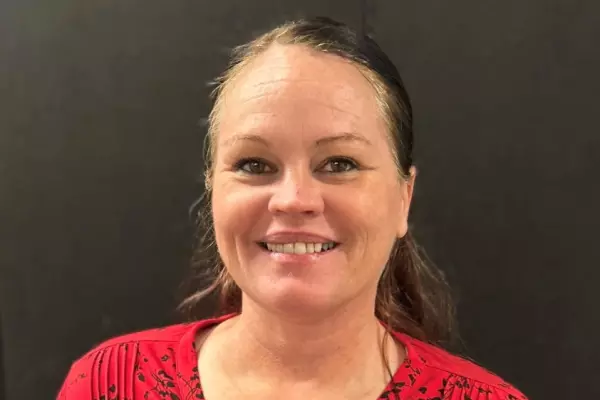
AU education helps former inmate find employment after prison release
Jessica Bruner never imagined she would have the opportunity to attend a university.
“But in September 2020, on a tablet with a rubber keyboard, I began my journey with Ashland University,” Bruner said. “By May 2022, I proudly accepted my associate’s degree in cap and gown. I didn’t stop there — I pushed forward and earned my Bachelor of Arts in Communication Studies in August 2023, graduating with honors as valedictorian.”
And in December 2023, she left prison, where she had spent the previous 19 years of her life.
Now Bruner works for Arouet Foundation, a nonprofit organization based in Phoenix that advocates for second chance employment and the practice of offering fair and equal job opportunities to individuals with criminal records.
The Perryville Arizona State Prison in Goodyear, Arizona, where Bruner lived for almost two decades is one of 125 correctional facilities across 13 states and the District of Columbia where AU delivers a transformational education experience to more than 3,000 students. AU's Correctional Education is the longest continuously operating program of its kind in the U.S., having started in 1964.
“While my degrees from Ashland University played a pivotal role in securing my position at Arouet, it was not just the academic achievements that mattered,” Bruner said. “Earning those degrees in the unconventional environment of prison, with very limited resources, gave me a strength and resilience that cannot be taught in a classroom. It gave me a relentless drive that wouldn’t allow obstacles to deter my determination to succeed.”
Finding gainful employment difficult with a criminal record
Bruner needed that “relentless drive” to eventually land her job at Arouet as finding gainful employment proved difficult with her criminal background.
According to Bruner, the unemployment and underemployment rate for individuals with a criminal history in Arizona is 67%.
While she worked in the fast-food industry and participated in one of Arouet’s reentry programs, Bruner applied for more than 100 jobs without success.
She talked about all that disappointment recently during a reentry event with one of Arouet’s partners, JP Chase Morgan, which offered mock interviews with finance professionals for former inmates to help them develop job-seeking skills.
“I would have really good interviews, and my background check would come back, and I wouldn’t get the job,” Bruner said in the release “I had 15 job offers rescinded. It was hard and it was defeating.”
But she didn’t give up and it eventually paid off.
In her job, she hopes to do the same for others who are in the same situation she was, by not only helping improve their job-seeking skills, but also by encouraging them to develop the determination that AU helped instill in her.
“Arouet is a vital organization in Arizona, and without partners like JP Morgan Chase and others, we wouldn’t be able to make the impact we do in this community,” Bruner said. “In February 2024, Alison Rapping, CEO of the Arouet Foundation, offered me a position as program manager. This opportunity — to join a team dedicated to creating positive change for economic stability and prosperity in Arizona — allowed me to become part of the change I had once sought for myself.”
Profound transformation helps lead Bruner toward an AU education
As much as Bruner has changed her life since she went to prison, she said it wasn’t until late 2018, when she surrendered her life to God that she experienced a profound transformation.
During this time, Bruner said she realized that real change had to come from within, so she stopped focusing on the judgments of others and embraced her journey of self-discovery.
“I let go of the guilt, shame and fear I had carried for so long,” she said. “It was as if I had been blind my entire life, and suddenly, I could see. Navigating life with a renewed purpose wasn’t easy — I was desperate to be different. Up until that point, I had ‘accomplished’ things for the wrong reasons, believing that pursuing education would somehow prove to the world that I wasn’t a bad person, that I had changed.
“For 15 years, I had been chasing opportunities to learn and transform myself, like trying to piece together a thousand-piece puzzle without ever seeing the full picture,” added Bruner, who had earned six Rio Salado College (in Arizona) certifications; 119 certificates in sales, marketing, training and development; and 32 certificates in self-improvement, anger management and interpersonal communication before surrendering her life to God. “I started this journey with a seventh-grade education and a negative view of life, unable to face the choices I had made or the pain I had caused.”
At first her “renewed purpose” led to her being accepted into a computer coding program, followed by what had been unthinkable for so long: attending a university, Ashland University.
“Though I earned these degrees while incarcerated, I was held to the same rigorous standards as every other student,” Bruner said about her AU experience. “What sets us apart; however, is that those of us incarcerated in Arizona pursuing education through Ashland University have no access to the public internet. Despite this challenge, I persevered and achieved what once seemed impossible.”